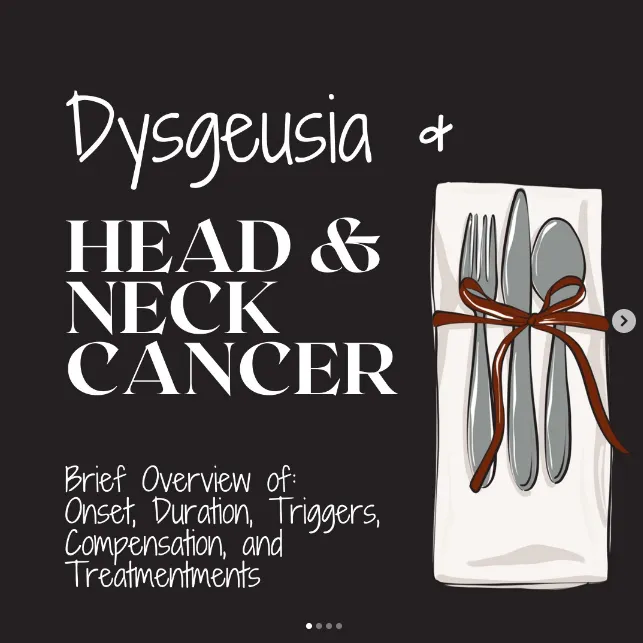Dysgeusia is a common symptom experienced by many head and neck cancer patients. Let’s talk about it today and how it can be managed.
The onset of dysgeusia can vary but it typically occurs during or after treatment for head and neck cancer.
What is Dysgeusia?
Dysgeusia is the medical term for changes in taste sensation that can make food and drinks taste strange, bitter, metallic, or even like nothing at all.
The cause of dysgeusia in head and neck cancer patients is complex, but it’s often linked to the cancer itself, chemotherapy, radiation therapy, and some medications.
Dysgeusia can have negative outcomes, such as decreased appetite, weight loss, malnutrition, and even depression. It can also lead to a loss of enjoyment of food and a decrease in quality of life.
Facts About Dysgeusia
Dysgeusia is a taste disorder characterized by the distortion or alteration of taste perception, often resulting in unpleasant or metallic taste sensations. It is a common complaint among cancer patients, particularly those in the head and neck population.
Taste buds are clusters of cells responsible for detecting different flavors. They are mainly located on the tongue but can also be found in other parts of the mouth and throat such as the epiglottis, pharynx, larynx, and some in the upper esophagus. Taste buds play a vital role in our ability to enjoy food and appreciate its quality. Head and neck cancer patients undergoing treatment are at a higher risk of developing dysgeusia due to various reasons.
It is hypothesized that chemotherapy can cause damage to taste buds and olfactory cells, can cause damage via neurotoxicity, or can cause damage as a side effect of xerostomia (dry mouth). This damage can result in taste distortion or loss.
Radiation therapy can lead to dysgeusia by damaging taste buds, by thinning the epithelial lining of the tongue, and reducing salivary flow, which can affect the ability to perceive taste. Moreover, radiation can also alter the expression of taste receptors and decrease the number of taste buds, leading to a decreased perception of taste.
In addition to chemo and radiation therapy, surgery in the head and neck region can cause damage to taste buds and nerves responsible for taste perception, leading to dysgeusia.
Dysgeusia can significantly impact a patient’s quality of life by reducing their enjoyment of food and leading to poor nutrition. This, in turn, can affect their overall health and well-being.
Prevalence, Onset, and Duration of Dysgeusia in Head and Neck Cancer.
Head and neck cancer patients often report experiencing dysgeusia, a taste disorder where their sense of taste is altered or lost.
Dysgeusia affects a high percentage of head and neck cancer patients, with prevalence ranging from 46-77%.
Dysgeusia can occur in:
66.5% of patients who receive radiotherapy
76.0% of patients who undergo chemoradiotherapy
70% of oral cancer patients
100% of smokers vs non-smokers (36%) who have radiation therapy and or chemoradiation therapy
11.4%-15% of total laryngectomees
Patients who undergo a larger resection of their tongue (glossectomy) have a higher percentage of complaints of dysgeusia
Dysgeusia typically occurs within 3-4 weeks of radiation treatment and may last from weeks to months. Typically, taste is recovered by 12 months. However, even after radiation therapy is finished, some patients continue to experience taste alteration, with around 15% of patients experiencing this as a late effect after radiation therapy.
Ways To Help With Dysgeusia
There are ways to compensate for dysgeusia. Patients can try to enhance flavors in food by using strong spices, marinades, and sauces. Cold foods and beverages may also help, as can avoiding foods with metallic aftertastes, like red meat.
Pharmaceutical treatments, like zinc supplements or certain medications, may help alleviate dysgeusia symptoms. Some natural remedies, like acupuncture or certain herbs, may also be beneficial.
Additionally, manual therapies like acupressure or massage may help stimulate taste buds and improve taste sensation.
Talk to your healthcare team about ways to manage this symptom and maintain good nutrition during your cancer treatment journey.


Great article hits home as having trouble with my taste buds but is slowly getting better Thanks Ms Moore